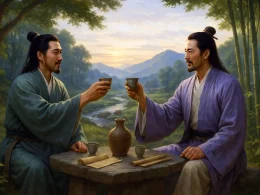Two men who live under one and same roof
Go different ways apart and aloof.
A man of letters drunken would appear;
A man of arms stays sober all the year.
They talk and laugh each at the other’s way
Of living and seem to laugh it away.
How foolish is a man laden with care!
How proud is the man who drinks in the air!
I would like to tell the drinker to light
A candle so as to drink in the night.
Original Poem
「饮酒 · 其十三」
陶渊明
有客常同止,趣舍邈异境。
一士长独醉,一夫终年醒。
醒醉还相笑,发言各不领。
规规一何愚,兀傲差若颖。
寄言酣中客:日没烛当炳。
Interpretation
Composed after Tao Yuanming's retreat to rural life, this thirteenth poem in his "Drinking Wine" series employs the metaphorical contrast between drunkenness and sobriety to explore divergent life choices. Through the juxtaposition of a fellow lodger's worldly attitude with his own liberated stance, the poet articulates his philosophical rejection of societal conventions and affirmation of spiritual freedom.
First Couplet: "有客常同止,取舍邈异境。"
Yǒu kè cháng tóng zhǐ, qǔshě miǎo yì jìng.
A guest often shares my dwelling, yet our chosen paths diverge as distant realms.
The opening establishes spatial proximity versus ideological distance, immediately framing life's fundamental dichotomy through shared residence but contrasting aspirations.
Second Couplet: "一士常独醉,一夫终年醒。"
Yī shì cháng dú zuì, yī fū zhōngnián xǐng.
One perpetually drowns alone; the other maintains year-round wakefulness.
This crystalline dichotomy positions the poet as the "drunken" seeker of transcendence against his guest's "sober" worldly engagement. The verbs "drown" (醉) and "maintain" (醒) encode entire philosophies of existence.
Third Couplet: "醒醉还相笑,发言各不领。"
Xǐng zuì hái xiāng xiào, fāyán gè bù lǐng.
Sober and drunk still mock each other; their speech finds no mutual comprehension.
The tragicomic standoff illustrates irreconcilable worldviews. Tao's choice of "mock" (笑) rather than debate underscores his detachment—he observes the divide without seeking conversion.
Fourth Couplet: "规规一何愚?兀傲差若颖。"
Guīguī yī hé yú? Wù ào chà ruò yǐng.
How foolish this rule-bound rigidity! While abrupt pride verges on luminous wisdom.
The explosive rhetorical question dismantles conventional propriety. Tao's paradox—that antisocial "pride" (傲) approaches enlightenment—challenges Confucian behavioral norms with Daoist spontaneity.
Fifth Couplet: "寄言酣中客:日没烛当秉。"
Jì yán hān zhōng kè, rì mò zhú dāng bǐng.
To fellow revelers I say: When sun descends, candles must be lit!
The concluding metaphor transforms drinking into a philosophical imperative—the "candle" symbolizing self-illumination as worldly light fades. This transcends hedonism into a metaphysics of self-reliance.
Holistic Appreciation
Through the metaphorical contrast between "drunkenness" and "sobriety," the poem presents two life choices: the sober who rigidly adhere to conventions while chasing fame and fortune, and the intoxicated who embrace unrestrained freedom while maintaining personal integrity. The poet clearly favors the latter, using "drunkenness" as escape from a turbid reality to seek spiritual liberation. Ironically, the sober, obsessed with worldly success and petty calculations, appear foolish; while the drunkard, though seemingly unrestrained, possesses inner clarity - reflecting the poet's transcendental detachment from material desires and unconventional reclusive spirit. The verses carry both satire and philosophy, revealing Tao Yuanming's detached observation and transcendent attitude toward worldly affairs.
Artistic Merits
The poem masterfully conveys philosophy through imagery, employing a contrastive structure of "drunkenness versus sobriety" to present metaphysical contemplation in allegorical form. Its language appears naturally simple yet contains profound wisdom, with balanced couplets that exhibit rhythmic variations. Rather than direct preaching, abstract concepts are embodied through characters and actions, making the poetic meaning both clear and subtle - forming Tao Yuanming's distinctive style of "embedding philosophy in scenery" and "fusing thought with emotion."
Insights
This poem offers crucial insights: human existence need not be rigidly confined by worldly notions of "sobriety" and "rationality," for true wisdom may reside beneath apparent "drunkenness." One should preserve authenticity amid life's turbulence, choosing a self-aligned lifestyle unswayed by external judgments. Tao Yuanming interprets freedom through "drunkenness" and urges seizing light by "holding the candle" - reminding us to cherish the present, maintain self-awareness, and live as our truest selves.
Poem translator
Xu Yuanchong (许渊冲)
About the poet

Tao Yuanming(陶渊明), 365 – 427 CE, was a poet, literary figure, fu writer, and essayist active during the late Eastern Jin and early Liu Song dynasties. Born in Chaisang (near present-day Jiujiang, Jiangxi Province), he pioneered a new genre of pastoral-themed literature, expressing profound philosophical insights through simple language. His poetic style became an enduring aesthetic standard in classical Chinese poetry.











